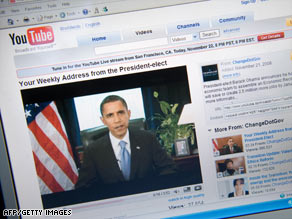"You Tube Presidency" 2009 by Virginia Heffernan
Barack Obama and his team know that Internet is the way of the world and the way of the future. For example a year ago , when he delivered his speech on the race, his "New media" Campaign uploaded their own version on to You Tube. This video alone got over 1.5 million views.
He now his an entire staff devoted to this "New Media Campaign"
Obama has recently been seen all over the web on sites like "You Tube , Joost , Daily Motion and Hulu" (to name a few). He takes his "offline" charisma and puts it "online:, which this article states that it takes an "extensive personal production team".
President Obama used these sites to his advantage. especially You tube. "Where as a You Tube search for Ex- President George bush turns up mostly parodies (like shown in last class - Obamas's (search) is stacked with videos approved and uploaded by the campaign or administration. Clips like the president signing of a public land protectors bill on Mach 30th , that would usually only be shown on C Span. And Obama's"Your Weekly Address" which is most viewed and subscribed are among the many videos that pop up when his name is being searched.
He now his an entire staff devoted to this "New Media Campaign"
Obama has recently been seen all over the web on sites like "You Tube , Joost , Daily Motion and Hulu" (to name a few). He takes his "offline" charisma and puts it "online:, which this article states that it takes an "extensive personal production team".
President Obama used these sites to his advantage. especially You tube. "Where as a You Tube search for Ex- President George bush turns up mostly parodies (like shown in last class - Obamas's (search) is stacked with videos approved and uploaded by the campaign or administration. Clips like the president signing of a public land protectors bill on Mach 30th , that would usually only be shown on C Span. And Obama's"Your Weekly Address" which is most viewed and subscribed are among the many videos that pop up when his name is being searched.








